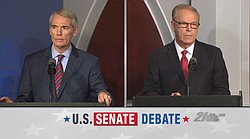Jobs and trade deals dominate debate
2016 Senate Debate on WFMJ

YOUNGSTOWN
International trade agreements and their impact on Ohio’s economy was a contentious topic in Friday’s debate between Republican U.S. Sen. Rob Portman and his Democratic challenger, former Ohio Gov. Ted Strickland.
The wide-ranging, one-hour, midday debate was televised live from the downtown Youngstown studio of 21 WFMJ-TV and co-sponsored by The Vindicator.
“The record of NAFTA has been mixed. I think it has resulted in some job loss and some job gain,” Portman said of the North American Free Trade Agreement.
“We send 40 percent of our exports from Ohio to NAFTA countries. Most of them go to Canada, so it is a big help for a lot of companies,” Portman observed.
“Are you willing to get down on your knees and ask the people of this Valley to forgive you for sending their jobs to China and Mexico,” Strickland asked Portman rhetorically.
“NAFTA is a big problem, and the people of this Valley, probably better than anywhere, perhaps in Ohio or the country, understand the effects of our trade deals,” Strickland added.
“He has participated in sending our jobs out of this country,” Strickland said of Portman, who was trade ambassador under President George W. Bush and voted for NAFTA as a congressman.
“We need to have agreements that open up markets for our workers, for our farmers. We don’t do enough of that,” Portman said.
“America does not export as much as we should compared to other countries,” he said, adding that NAFTA needs to be updated to make it more favorable to the United States.
“Ted Strickland’s got to answer to those people who are going to lose their jobs because of the lost exports because he refuses to support any trade enhancement agreement to open up new markets for our products,” Portman said.
Portman said 9 out of 10 of the 350,000 Ohio jobs lost while Strickland was governor went to other states, not other countries.
While Strickland was governor, exports increased nationally, but declined in Ohio, Portman said.
Declining exports meant fewer jobs and lower wages and benefits, the senator added.
Another major clash between the senator and his challenger was in response to a question from Cassandra Peterson of Youngstown, who asked where the candidates stand on raising the minimum wage.
“I support raising the minimum wage,” Portman said, adding that he favors indexing it to inflation.
“Let’s take the politics out of it, so you don’t have these big stair steps that create all this job loss,” Portman said.
Strickland estimated Portman earns about $334 per hour from his Senate salary and investments.
“And yet, there was a bill in the Senate to raise the minimum wage to $10.10 an hour, and he voted against it,” Strickland observed.
“I think, when a person works hard, they ought not to have to live in poverty,” the former governor said.
“I want to raise the minimum wage,” he added.
Portman retorted that the $10.10-an-hour proposal would have caused loss of 500,000 jobs, according to the nonpartisan Congressional Budget Office.
Noting that only Florida and California lost more jobs than Ohio while Strickland was governor, Vindicator politics writer David Skolnick asked Strickland why Ohio lagged so far behind the rest of the country under his leadership.
“We did lose a lot of jobs, and we lost more jobs than some states because of the nature of our economy. We’re a heavily manufacturing state,” Strickland explained.
“Job-killing trade deals,” were especially detrimental to Ohio, he said.
“The recession hit in ’08 and ’09. By the time I left office, Ohio had the fastest growing economy in the Midwest and the fifth fastest growing economy in America,” Strickland said.
“We took a big hit during the recession. ... People lost jobs and homes. A lot of people lost hope,” he said, adding that he didn’t cause the recession and the job and home losses.
“I worked hard to keep our state in a stable position,” he said.
With programs such as the federal stimulus, “We were able to invest in communities like Youngstown and other communities across the state, so that I gave [Gov.] John Kasich a recovering economy,” Strickland said.
“He left John Kasich an $8 billion record deficit. He took the rainy-day fund from $1 billion down to 89 cents,” Portman retorted.
Strickland said the allegation that he left an $8 billion deficit is “absolutely not true. I was constitutionally required to balance the budget, and I balanced the budget.”
“Sen. Portman, we did have a national recession. It was caused by Washington and Wall Street. You were the budget director for [President] George W. Bush in the two or three years leading up to that recession, and you need to accept responsibility for that job loss as well,” Strickland said.
In post-debate news releases, the Ohio Democratic Party and the Strickland campaign called Strickland the victor; and the Portman campaign called its candidate the winner.
The Ohio Democratic Party called Portman “a lap dog for the wealthy special interests that are spending tens of millions of dollars to prop up his campaign.”
The Portman campaign said Ohio voters have a clear choice between “Rob’s pro-growth policies for higher wages and more jobs or a return to Retread Ted Strickland’s failed policies of higher taxes, burdensome regulations and bigger government.”
When they arrived for the debate, the candidates were greeted by pro-Portman pickets in front of the TV station, who faced pro-Strickland pickets on the city hall side of Boardman Street.
Their voices echoing in the canyon of downtown buildings, the pro-Portman pickets chanted “Rob for jobs,” and “Put Ted to bed,” and the pro-Strickland pickets shouted back: “Do your job.”
 43
43
